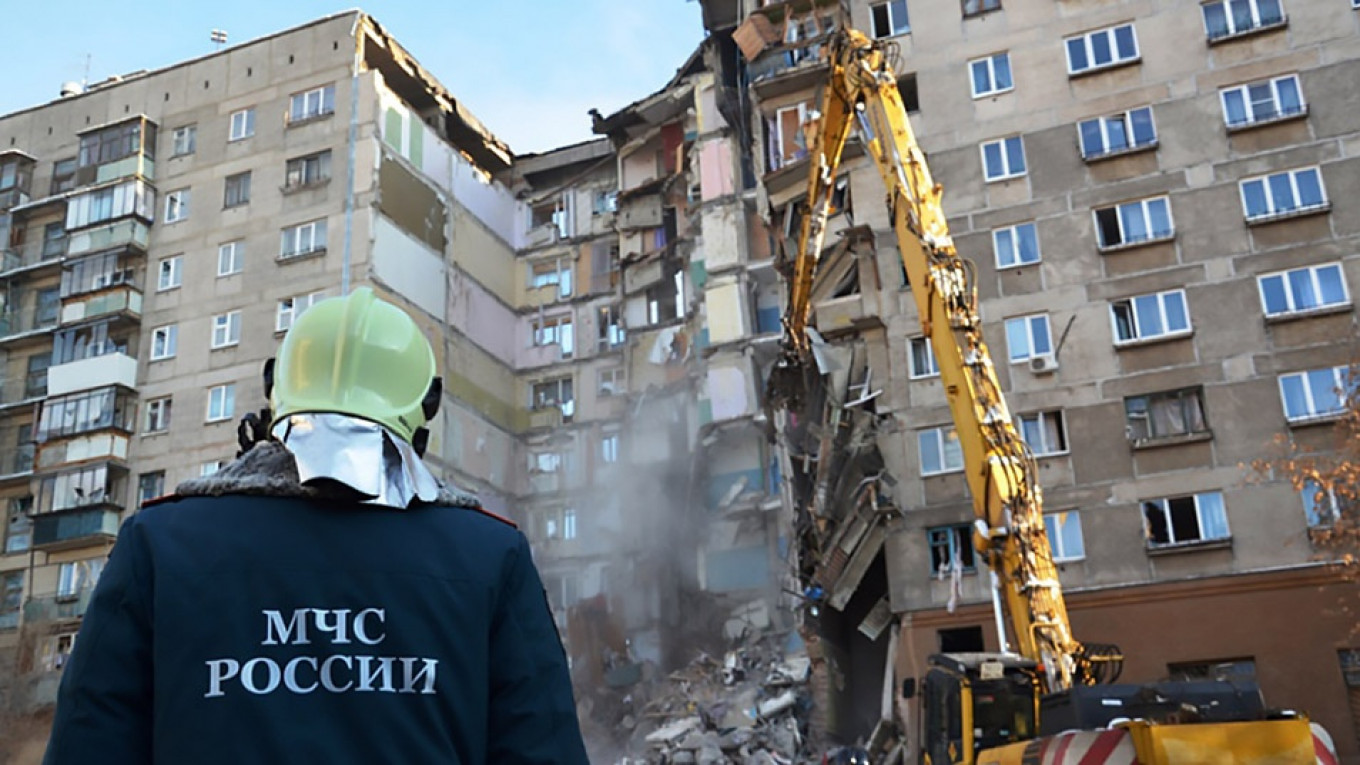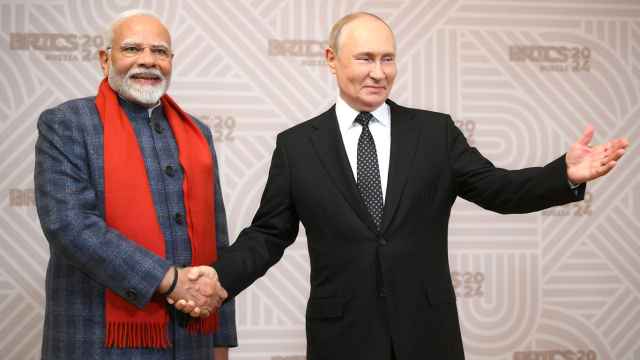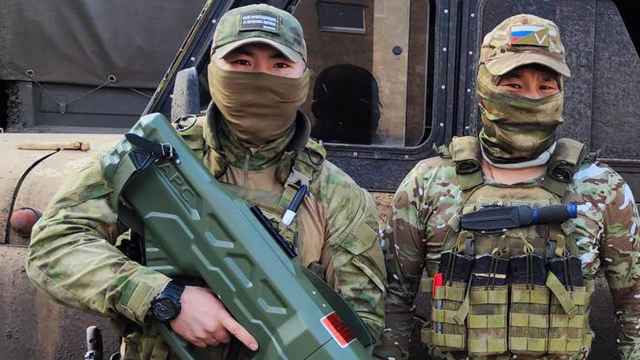The year 2019 got off to a tumultuous start in Russia. An explosion in an apartment building in Magnitogorsk, a major industrial city in central Russia, that killed thirty-nine people and left dozens injured caused an intense national conversation about the cause of the tragedy, the value of human life, and the state of political power in today’s Russia.
In the early hours of New Year’s Eve day an entire entry section of a long, ten-story housing block went crashing down after an explosion destroyed a lower-level apartment.
Officials blamed a gas leak, but security agencies were silent for the first four days of January and are still chary with details. In an episode that may or may not be related to the tragedy, a minivan with three people inside caught fire and burned in the neighborhood the day after the explosion, fueling rumors about a manhunt for terrorists under way in the city.
Explosion or Bombing?
The authorities have since reiterated that no traces of explosives were found in the rubble of the apartment block, but the possibility of terrorism is still on people’s minds. “An ordinary gas leak could not have caused this kind of collapse,” a journalist from Magnitogorsk reported local residents as saying. “They don’t tell us anything, that’s why I think it was an act of terrorism,” another local resident said.
“All the investigators and inquiry officers working on the case are from Moscow. Local officials are not even in on the case,” Vladimir Ruga, deputy director of the Magnitogorsk iron and steel works, said in an interview. The silence from Moscow does not help diffuse tensions and suspicions.
In Russia, an eerie parallel to the Magnitogorsk tragedy is not hard to come by. The very sight of an entire section of a typical Soviet-built housing block collapsing like a deck of cards calls to mind images of houses that were bombed twenty years ago, in 1999. Those bombings were a series of explosions that hit four apartment blocks in Buynaksk, Moscow, and Volgodonsk in September 1999, killing 293 people and sending a wave of fear across the country. Some later compared the apartment bombings of 1999 to America’s 9/11. Allegations that the blasts were a false-flag operation by Russian security agencies circulated widely.
The official investigation blamed the blasts on Chechen militants. The rookie Prime Minister Vladimir Putin’s handling of the crisis and his tough rhetoric boosted national support for the Second Chechen War (active phase, 1999–2000). Putin’s response to the events of 1999 did much to change the nature of the Kremlin’s legitimacy. During Boris Yeltsin’s presidency (1991–1999), it was about rebuilding a country that had emerged from seven decades of totalitarianism. Under Putin it was about fighting enemies, both domestic and foreign. The latter proved a much more viable narrative than the former.
But the Magnitogorsk tragedy struck at a historical moment when this narrative is starting to lose steam. Today’s Russia is very different from the Russia of Putin’s early days in power. Russian society is maturing; it is much more self-reliant and compassionate than it was twenty years ago. Volunteers kept pouring into the site of the blast in Magnitogorsk, even though ample numbers were already there. People would bring food for the rescue crews and clothes and toys for those who had lost their belongings.
The mood in Russia seems to be turning inward toward domestic issues. The way many Russians see it, Russia has been helping other countries a lot—and that includes helping Ukraine fight “fascists.” This conviction, partly shaped by propaganda, partly genuine, is now waning. As the economy has stagnated and incomes have been in decline for at least four years, people are now saying, “Let’s stop helping everyone else. Let’s help ourselves.”
News about bombings ignited patriotic zeal twenty years ago, but a similar news item these days would only elicit a tired reaction. One has to be realistic: it is the Kremlin’s political decision that will define the cause of the tragedy for the public, not an independent and transparent investigation. Whether the authorities attribute the tragedy to an explosion caused by a gas leak or an act of terrorism will reflect the Kremlin’s reading of the mood of the population.
Precious Square Meters
People seem to expect the government to take better care of the population, its housing and infrastructure needs, not to launch into another war of revenge against an enemy, whoever it might be this time.
The building affected by the explosion in Magnitogorsk is a ten-story prefab concrete structure built in the early 1970s. It is hard to believe, but a government commission that inspected the building has decided that the remaining parts are still fit for occupation. The ruined section will be dismantled, and people will have to return to their apartments.
The city of Magnitogorsk, located about 1,700 km (1,000 miles) east of Moscow, is a company town famous for its iron and steel works, MMK. Built in haste on a mineral-rich greenfield in the 1930s, MMK was a prominent part of Joseph Stalin’s massive industrialization effort. The story of Magnitogorsk is the typical story of a Soviet town, with the construction of housing for workers given short shrift in the industrialization drive.
Today, MMK is majority owned by its former CEO, Viktor Rashnikov, who, according to Forbes, was worth $8.2 billion in 2018. The average wage in Magnitogorsk is less than $600 a month (a bit less than 40,000 rubles), which is not bad by Russian standards.
Yet many of the housing blocks, like the building that partly collapsed, are approaching the end of their life span, which for similar structures is often put at fifty years. Can these housing blocks survive into the 2020s and the 2030s? Yes, but they will need a lot of maintenance work. It doesn’t take terrorism to render these buildings dangerous. Gas-related emergencies, though normally resulting in fewer victims, happen every year by the dozen.
The real challenge to anyone who governs or will be governing Russia is the state of the housing stock. In 2012 the Higher School of Economics estimated that an investment of more than 20 trillion rubles would be needed to keep the existing housing in habitable shape. At this stage it is difficult to see where the funds would come from.
Maxim Trudolyubov is a senior fellow with the Kennan Institute, where this article was originally published. The views and opinions expressed in opinion pieces do not necessarily reflect the position of The Moscow Times.
A Message from The Moscow Times:
Dear readers,
We are facing unprecedented challenges. Russia's Prosecutor General's Office has designated The Moscow Times as an "undesirable" organization, criminalizing our work and putting our staff at risk of prosecution. This follows our earlier unjust labeling as a "foreign agent."
These actions are direct attempts to silence independent journalism in Russia. The authorities claim our work "discredits the decisions of the Russian leadership." We see things differently: we strive to provide accurate, unbiased reporting on Russia.
We, the journalists of The Moscow Times, refuse to be silenced. But to continue our work, we need your help.
Your support, no matter how small, makes a world of difference. If you can, please support us monthly starting from just $2. It's quick to set up, and every contribution makes a significant impact.
By supporting The Moscow Times, you're defending open, independent journalism in the face of repression. Thank you for standing with us.
Remind me later.








